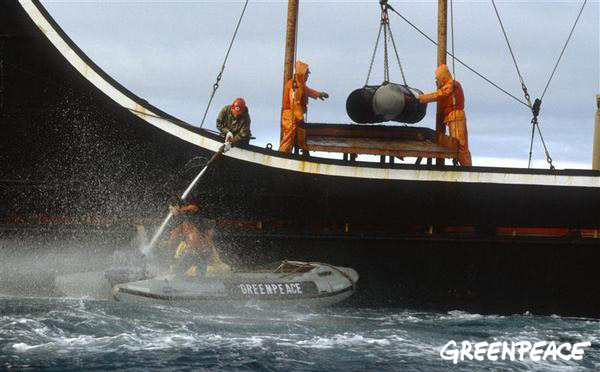
Reading the latest edition of UNEP's Global Environmental Outlook (PDF) last week was enough to make me lose the will to live.
It was sad to read what we all intuitively know: "The world continues to speed down an unsustainable path despite over 500 internationally agreed goals and objectives to support the sustainable management of the environment and improve human wellbeing."
I was tempted to join the ranks of "Ladies against Women." Remember them? This 1980s satirical troupe of anti-feminists called for abolishing the environment: "It takes up too much space, and is almost impossible to keep clean."
After 30 years of being an activist, I had to wonder -- has it really been all for nothing?
In fact, no. Thinking back to a few of the most memorable environmental campaign victories from my own experience, it's fair to say that had they not been won, the world would be even closer to -- perhaps already beyond -- that catastrophic tipping point, the point of no return, which the UNEP report warns us about.
Here are some examples:
1. Starting with the one closest to my heart, Antarctica. From 1982-1988, a handful of countries -- self-appointed stewards of one of the most hostile and environmentally sensitive places on earth -- negotiated a convention to open up Antarctica to oil drilling and mining. As the first Director of the Australian Antarctic envisaged it in 1964 (PDF):
... mining deep inside the rock of the peripheral mountains of Antarctica will proceed throughout the long winter months... hollowed out of the rock, irradiated with simulated sunshine generated electrically from nuclear power, the mining townships will be independent of surface weather conditions and shift work will proceed around the clock...
By 1990, after eight years of intensive campaigning, defying the prevailing wisdom which considered our call for a "World Park" unrealistic, the Antarctic Treaty Parties did an about-face. In two short years, they went from unanimously supporting the mining convention to rejecting it and unanimously supporting a comprehensive protection agreement instead. As I was often quoted as saying at the time, "if we can't save Antarctica, what hope do we have of saving the rest of the planet?"
2. Global Ban on Ocean Dumping. It's hard to believe that as recently as 30 years ago, the world's open oceans were treated with little more regard than an open sewer. Companies and governments routinely chartered vessels to dump their garbage, including toxic chemical and radioactive waste, straight into the sea (PDF).
As the campaign against ocean dumping began to bite in the 1980s, and rules for dumping at sea were tightened, they came up with other creative solutions for disposing of the nastiest stuff -- like depositing it under the seabed, or incinerating it at sea. Out of sight, out of mind, and out of the public eye... or so they'd hoped. By 1993, one year after the first Rio Earth Summit, these practices were banned permanently worldwide, and there are no longer any country objections to the agreement. If you think fish stocks are in trouble now, just imagine where they'd be had it not been for this campaign.
 Activists blocking nuclear waste dumping. Photo courtesy of Greenpeace /Pierre Gleize, 1982
Activists blocking nuclear waste dumping. Photo courtesy of Greenpeace /Pierre Gleize, 1982
3. Offshore Oil Drilling. On July 21, 1982, two days after I started my first campaigning job (at Greenpeace in Boston), U.S. Interior Sec. James Watt offered up the entire U.S. outer continental shelf -- a total of a billion acres -- for oil and gas exploration and development.
His highest priority was to lease "frontier" areas, and he was prepared to sacrifice some of the U.S.'s most environmentally sensitive marine ecosystems -- off of Alaska, California and New England. (Come to think of it, the plan was not dissimilar to that of Stephen Harper's all-out offensive to develop Canadian tar sands).
As a result of the campaign against the Watt plan -- during which I once bid on 500 tracks on Georges Bank with no legal consequences I might add -- Congress passed a moratorium on leasing many of the most sensitive areas. The ban on new offshore oil development was reapproved annually up until 2008, and as a result of the Deepwater Horizon accident, offshore policy still remains in flux.
These were not just paper tigers, agreements made then left on the shelf to rot. Some might suggest that these were somehow easy victories, clear cut black-and-white cases compared to the complexity of the issues to be addressed at next week's Earth Summit in Rio. In some respects this is true, but all I can say is they didn't feel easy at the time.
If I've learned anything over the last 30 years, it's the importance of having impossible ambitions. As Nelson Mandela once said, "it always seems impossible until it's done."
